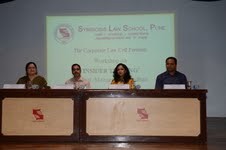Corporate Law Cell, Symbiosis Law School, Pune
Corporate Law Cell, Symbiosis Law School, Pune successfully conducted a workshop today on Insider Trading in the Vishwabhavan Auditorium, SB Road, from 11:00am to 1:00pm.

Insider trading is defined as the use by corporate insiders and their associates of confidential price sensitive information which has been obtained by them by virtue of their position so as to make a profit or avoid a loss by dealing in the securities of the relevant company.
.jpg)
Mr. MangeshPatwardhan an IIM- Bangalore Post Graduate who is presently working with National Insurance Academy, Pune, as an Associate Professor was the chief guest and resource person for the workshop.
Work shop began with the welcome address by DrBindu Ronald, Deputy Director,Symbiosis Law School, Pune. After the felicitation of Chief Guest, Mr. Patwardhan took over the reins and simply mesmerized the audience with his expertise over the subject - the insider trading. He began with1948 – P J Thomas Committee (Economic Advisor – Ministry of Finance – Government of India) – Report on the Regulation of the Stock market in India, and finally reached SEBI Act, 1992 discussing various cases and touching all the evolutionary milestones in between.
.jpg)
He said,"Insider trading" is a term that most investors have heard and usually associate with illegal conduct. But the term actually includes both legal and illegal conduct. The legal version is when corporate insiders—officers, directors, and employees—buy and sell stock in their own companies.Illegal insider trading refers generally to buying or selling a security, in breach of a fiduciary duty or other relationship of trust and confidence, while in possession of material, non-public information about the security. Insider trading violations may also include "tipping" such information, securities trading by the person "tipped," and securities trading by those who misappropriate such information.
He said, “Corporate officers, directors, and employees who traded the corporation's securities after learning of significant, confidential corporate developments;Employees of law, banking, brokerage and printing firms who were given such information to provide services to the corporation whose securities they traded; Government employees who learned of such information because of their employment by the government; andOther persons who misappropriated, and took advantage of, confidential information from their employers are all the examples of Insider Trading.”
Insider trading can be prompted by prior information of various events connected with the company. These events may include the ensuing announcements of financial results, information on bonus or right offers or more sensitive information relating to merger/amalgamation/demerger.
He said, a newer view of insider trading, the misappropriation theory, is now part of US law. It states that anyone who misappropriates (steals) information from their employer and trades on that information in any stock (either the employer's stock or the company's competitor stocks) is guilty of insider trading.
Of the various reasons emphasising the need for inhibiting insider trading, the most important is the need to preserve public confidence. To allow insiders to trade on the basis of privileged information destroys the occurrence of a level playing field between the insiders as investors and the remaining shareholders. It highlights the need to regulate insider trading.
With the object of curbing and preventing insider trading in India, the SEBI has issued a regulation for the prevention of the same in 1992 (revised in 2002). The regulation renders insider trading as a criminal offence, under certain circumstances punishable under the SEBI Act. Insider trading is not only a menace but also a stumbling block in the adoption of good governance practices by corporates. For self-aggrandizement and profiteering, all norms of honesty and fair play are thrown to the winds and the image of the entire corporate sector is tarnished due to the manipulative activities of a few. Hence, the regulations to curb insider trading have a special significance in India. He explained Section 11(1), 11(2), 12A of SEBI Act, 1992 and said that the Penalty for insider trading is mentioned under section 15G.
The lay perception in India is that the Indian legal system is sorely lacking and backward in insider trading law while the US is sophisticated in this department. In reality, Indian law, and the attitude of SEBI and the judiciary towards insider trading is far more stringent than in the US – and in some instances, unjustifiably so.
The interactive session by ProfPatwardhan was further taken over by our BBALLB Ist Year Students, Vignesh Raj, ShubhamVineet and ArvindManoharam, who presented an excellent case study over Rajat Gupta- an Insider. Their case study unfolded the facts about Rajat Gupta right from his birth, his family background, education , professional life and court trials to the final verdict of the court. They also highlighted his contributions towards social welfare.
Finally the workshop came to an end with the vote of thanks by Prof Surya RashmiRawat, the Professor –in- Charge, Corporate Law Cell, Symbiosis Law School, Pune.
Join LAWyersClubIndia's network for daily News Updates, Judgment Summaries, Articles, Forum Threads, Online Law Courses, and MUCH MORE!!"











